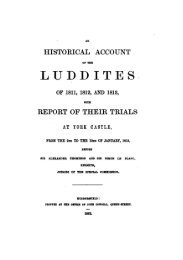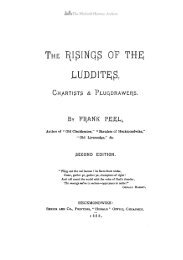OLD MIRFIELD DAYS - Mirfield - A Second Look
OLD MIRFIELD DAYS - Mirfield - A Second Look
OLD MIRFIELD DAYS - Mirfield - A Second Look
Create successful ePaper yourself
Turn your PDF publications into a flip-book with our unique Google optimized e-Paper software.
some of his family still live. This corner of the Beck was a fairly important function prior to the<br />
building of the Hopton New Road, that is from the Beck to Boathouse Lane, it was common at this<br />
time and perfectly legal to continue up Hagg Lane, cut across the Wood to the right, continue up Long<br />
Jones side in the wood, and emerge at this end of Mouse Hole Lane and thus to Whitley. I have done<br />
this trip with horses and carts many times. The actual building of the new road was undertaken to<br />
relieve unemployment at the time I think, after the 1870 French War when the demand of war materials<br />
would be over and the new factories would be either out of business or working at very low rate, again<br />
though in this area there was for a short time quite a spurt in the opening up of pits. Buzzer Pit and one<br />
in New Hall Wood, the original one at the Cuckoo Hill are examples, they were short lived and did<br />
very little to alter the economics of the natives.<br />
The Beck was just a few houses and a beck and was a bottle neck through which people passed on the<br />
way to our Metropolis. <strong>Mirfield</strong>, or Eastthorpe Lane, you could have left your home in Whitley,<br />
Briestfield, Grange Moor, Liley Lane, the Toppits district, perhaps you lived in one of the 'big' houses<br />
of which there were several round about. You could have descended literally via Long Jones, Crow<br />
Croft, the Briar Knowle or the Toppits and New Hall Lane, to get to <strong>Mirfield</strong> you had first to pass the<br />
Beck. In a day's time, if it be nice you could spot people from all these districts, perhaps a collier from<br />
Grange Moor, going to the station to collect a poor little school lad from an orphanage in Liverpool,<br />
perhaps two brothers would be collected, they would look like frightened birds as they peered up at<br />
their new protector, little did they know what was in store for them, a long day in some pit, pushing<br />
scoops, trams, call them what you like, five, six days a week, perhaps 10 hours a day, their new found<br />
benefactor had given them a home and hard job to go with it. A lot of these lads were killed in the<br />
1914-18 War, as they got a bit older they would come down into <strong>Mirfield</strong> to the new fangled pictures at<br />
<strong>Mirfield</strong> Town Hall, 1d for the pictures, 1d for fish and chips and 1d for a bottle of “pop ” .<br />
The biggest noise would be Heblethwaits farm dog 'Prince' letting off steam, perhaps occasionally a<br />
beealling cow that had just missed her calf, perhaps the cuckoo calling; you could sit and listen and<br />
watch the world you then knew pass by, if it was a warm day—with your feet in the beck. Suddenly<br />
you would hear the orderly clip, clop of horses' feet, a stylish pair of horses yoked to a lovely carriage<br />
would be coming along the road, it came from Cote Wall, a lovely place with its back nearly to Hagg<br />
Wood, passing it and going the other way, a pair of horses and carts taking coal from Whitley to<br />
Dewsbury or Ravensthorpe, from September to April, Jack Mathewman would pass you with his three<br />
horse team leading barley from the station to a kiln at Shepley Bridge, he used to put four tons a time<br />
on a tremendous wagon built for the job.<br />
On a Monday after 4 o'clock you would see Mr. Dawson, all the lads knew Mr. Dawson, he was a<br />
master at the Reformatory School and collected lads from the train at <strong>Mirfield</strong> Station, usually from<br />
Sheffield where they would have been sentenced to some years at the school for some offence in their<br />
home City. They always looked poor, little, thin lads, with white pasty faces, some looked fairly wick,<br />
others sickened with the business and mostly in rags, sometimes there would be five or six of them in a<br />
little gang. Mr. Dawson, who looked a giant in those days, would shout at them to keep them together<br />
and get them through Hagg Wood to the school, they never tried to run away on a Monday night, some<br />
did on a Tuesday night though, at school time next morning when we were all ready for off, my mother<br />
would say "Oh dear, look at those poor lads again", perhaps there would be two or three this time in the<br />
custody of the keepers, who I think got paid for capturing these poor kids, my mother would cry and<br />
call out to the keepers not to hurt them.<br />
But this part of our home ground was heaven itself, everything that God intended man to enjoy was<br />
here, lovely woods, fields, becks. all the wild animals and birds that the country lad lived with, scores<br />
of rabbits, pheasants, a hare or two, a hedgehog, sometimes a weasel. You might hear his prey<br />
screaming out if he had not been quick enough to get away, you might find a partridge nest with a<br />
dozen eggs in. these you had to surrender to the keeper. I once sat on the wall near the bottom of New<br />
Hall Hill listening to a grass drake calling, now under my feet, the next call far away by the iron hurdle<br />
fence, the next in the middle of the field where the wild dog daisies grew. A new born foal and its farm<br />
mare mother called Violet, were near to the last call, she held her head high and still, she seemed to be<br />
listening, then a few pulls of the longer grass, now another listen, this time she moved away in an<br />
excited manner, called to her foal and whinnied again, her ears pricked, she now left her foal and<br />
galloped towards me, swung round and held her head high, called gain for her foal to join her, listening.<br />
This time I could hear the noise that upset this poor mare, it was an aeroplane, the first ever seen here. I<br />
saw it quite plainly and ran home to tell mother. It did not seem long before I saw one of these things at<br />
Ypres with a chap hanging out trying to kill me with a machine gun.<br />
If you could spare the time, you could wait by Hebblethwaits, have a bit of crack with one of the lads,<br />
Ernest was my pal at this time, maybe sit on the wall, hear the birds sing, watch the fancy horses trot<br />
by, the farm horses rattling the chains of a set of plough gears or mowing tackle, if in Winter time a<br />
23




